Why are ScotRail workers striking during COP26?
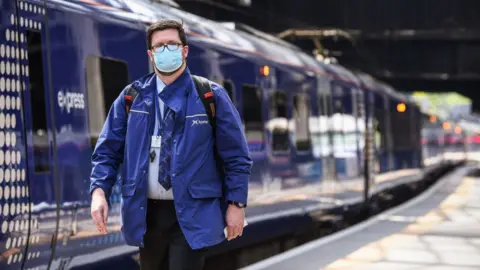 Getty Images
Getty ImagesScotRail engineers have said they will take strike action that will "severely disrupt" the COP26 climate summit in Glasgow.
It is the latest stage in a long-running dispute over pay and conditions and proposed cuts to services at the rail operator, which wants to reduce the number of services across Scotland by 300 a day from next May.
Unions and management are due to meet again on Tuesday afternoon, when a fresh offer is expected to be made to workers.
ScotRail is currently run by Dutch firm Abellio - but will be taken over by a company owned and controlled by the Scottish government in March of next year.
The move was announced by the government earlier this year after Abellio was stripped of its contract three years early amid concern over its performance.
Why is a strike being held during COP26?
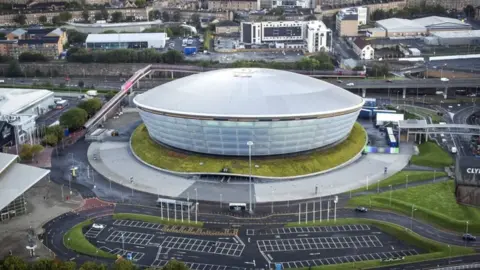 PA Media
PA MediaThe Unite union said on Monday that about 250 engineers - who maintain and repair ScotRail's fleet of trains - would stage a series of 24-hour strikes in the coming weeks.
Several of the dates clash with the climate summit, which will see world leaders come to Glasgow from 31 October until 12 November.
The union said it had been left with no choice due to what it described as the "reckless" actions of Abellio ScotRail management and its failure to make a "meaningful" pay offer.
The company has previously rejected a number of demands, including a "substantial" pay increase, greater flexibility of holidays, and no compulsory redundancies.
And unions have questioned why ferry workers can be given a 4.8% pay increase but rail workers cannot.
A number of rail depots, workplaces and stations will be impacted by the strikes, including Glasgow Queen Street and Glasgow Central, Edinburgh Waverley and Perth.
Unite's industrial officer, Pat McIlvogue, accused ScotRail of having attempted to spin out and delay talks over pay in an attempt to "avoid the national embarrassment" of having strike action during COP26.
But he said this had now "backfired" - and predicted that the conference and other events would be severely disrupted by the industrial action.
He also called on the Scottish government to intervene in the dispute.
Why haven't trains been running on Sundays?
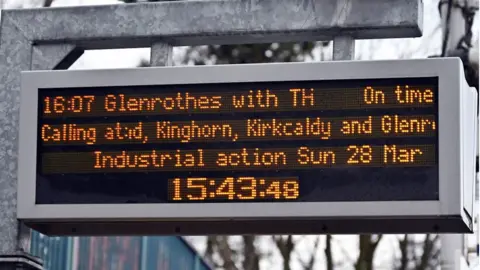 Getty Images
Getty ImagesConductors who are members of the RMT union voted in March to take strike action in a dispute about overtime pay, which centres around conductors being paid less than drivers for working on rest days.
That industrial action is still ongoing and has wiped out the vast majority of ScotRail services on a Sunday for the past six months - with neither side in the dispute showing any sign of backing down.
ScotRail said it was facing a "stark" financial situation in the wake of the pandemic, and said everyone needed to work together to modernise the railway so it is fit for the future.
And it said it would continue to engage with trade unions to find an agreement on pay and conditions.
What cuts are ScotRail proposing to rail services?
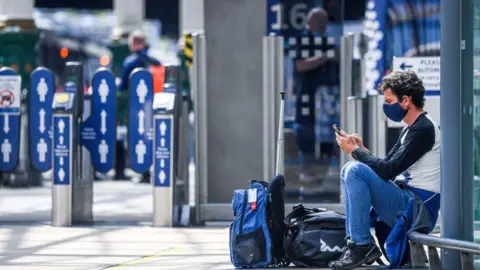 Getty Images
Getty ImagesAbellio ScotRail recorded losses of £64.5m in the financial year to March 2020 - before the full impact of the pandemic hit - and has been receiving emergency funding from the government since then to help it cope with the massive reduction in passenger numbers.
The rail operator says it wants to introduce a new timetable in May of next year that would see it run 2,100 services on a weekday rather than the 2,400 that were running before Covid.
The figure is slightly higher than the reduced number of about 2,000 daily services that have been running during the pandemic.
ScotRail says it had been providing "significantly more seats" than were required by passengers on several routes across the country before the pandemic - with only about a quarter of seats taken on the average day.
It said most passengers would not see any great change to services at their station, and insisted that the new timetable will help to improve the punctuality and reliability of services.
ScotRail added: "Returning to a pre-pandemic timetable would result in trains operating 26 million more vehicle miles each year for little customer benefit.
"As well as increased emissions, that would increase ScotRail costs to the taxpayer by £30m to £40m each year."
Why are unions angry about this?
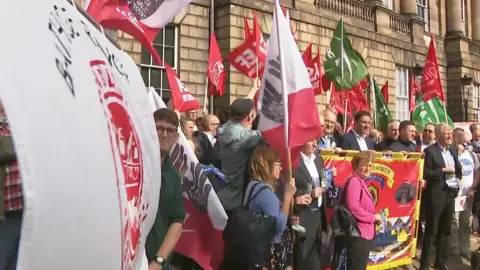
Unions believe that cutting rail services will also result in jobs being lost, and argue that the move is incompatible with the Scottish government's aim of encouraging more people to use public transport.
They have also warned that the cuts will hit vulnerable people, particularly the elderly and disabled, hardest, and have claimed that the country only has "six months to save Scotland's railways".
The main rail unions - the RMT, Aslef, TSSA and Unite - say the Scottish government has the powers to block the cuts to services now, despite not formally taking over ScotRail for another six months.
They say this is because the government is already effectively managing the ScotRail franchise under emergency powers that were introduced in April of last year to ensure trains continued to run throughout the Covid pandemic.
The four unions recently held a joint protest outside the first minister's Bute House residence, with RMT general secretary Mick Lynch saying the government "cannot evade responsibility" over the proposed cuts.
He added: "With COP26 just weeks away, it beggars belief that the Scottish government is happy to preside over massive cuts to rail services, despite this being a sustainable and low carbon form of transport.
"This will do nothing to make Scotland a 'net zero nation' and will just push more people into cars."
What has the Scottish government had to say?
Transport Minister Graeme Dey said that the government had been encouraging the unions and ScotRail management "for many months" to come to a resolution in the dispute.
And he called on both sides to "step back from some of the rhetoric" and instead focus on coming to an agreement.
Speaking to the BBC's Good Morning Scotland programme on Tuesday, he said spending on Scotland's railways was about £1bn before the pandemic but was now more than £1.5bn.
He said this was not sustainable, so efficiency savings would have to be made.
And he said he hoped that the unions would view the new offer from ScotRail "in the spirit in which it is being made", and that they would consider settling the dispute.
